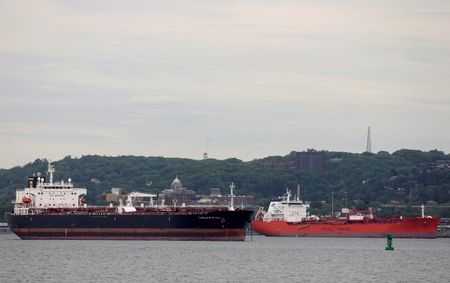By Stefanno Sulaiman and Gayatri Suroyo
JAKARTA (Reuters) – Indonesia’s trade surplus narrowed more than expected in December, official data showed on Monday, as the effect of the global commodity supercycle further waned for the resource-rich country.
Indonesia had a $3.89 billion trade surplus in December, data from the statistics bureau showed, smaller than the $4.01 billion expected in a Reuters poll. The surplus in November was worth $5.16 billion.
Southeast Asia’s largest economy saw an export boom for most of 2022 fueled by high global commodity prices, which had propped up the rupiah exchange rate and improved its current account position. But export growth slowed later in the year as prices moderated.
The rupiah, which had continued its rally and appreciated by more than 1% against the dollar earlier on Monday, pared some gains after the data was released, to trade 0.8% up from the last closing.
For all of 2022, exports were worth $291.98 billion, a historic high for annual shipments and 26.07% higher than in 2021. Imports last year were worth $237.52 billion, up 21.07% from the year before.
The surplus in 2022 was $54.46 billion, also a record high.
December exports rose 6.58% on a yearly basis to $23.83 billion, roughly in line with the poll’s forecast of a 6.65% increase.
Imports declined 6.61% on a yearly basis, the biggest drop in two years, to $19.94 billion, compared with the poll’s prediction for a 7.58% decline.
DBS Bank economist Radhika Rao said the 2023 trade trend would be more mixed, with commodity prices continuing to normalise, while China’s reopening from COVID-19 restrictions would provide a hedge against a potentially larger export drop.
“Despite a narrower trade surplus, rebound in the tourism sector and relief on transportation costs will help prop the services balance, translating into a small current account surplus,” Rao said.
The rupiah has strengthened sharply in the past few days, bolstered by hopes the Federal Reserve would slow its pace of U.S. interest rate hikes.
Indonesia is the world’s largest exporter of palm oil and thermal coal. It is also a major supplier of tin, copper, rubber and nickel products, among other commodities.
(Reporting by Stefanno Sulaiman, Gayatri Suroyo, Fransiska Nangoy; Editing by Kanupriya Kapoor, Martin Petty)











